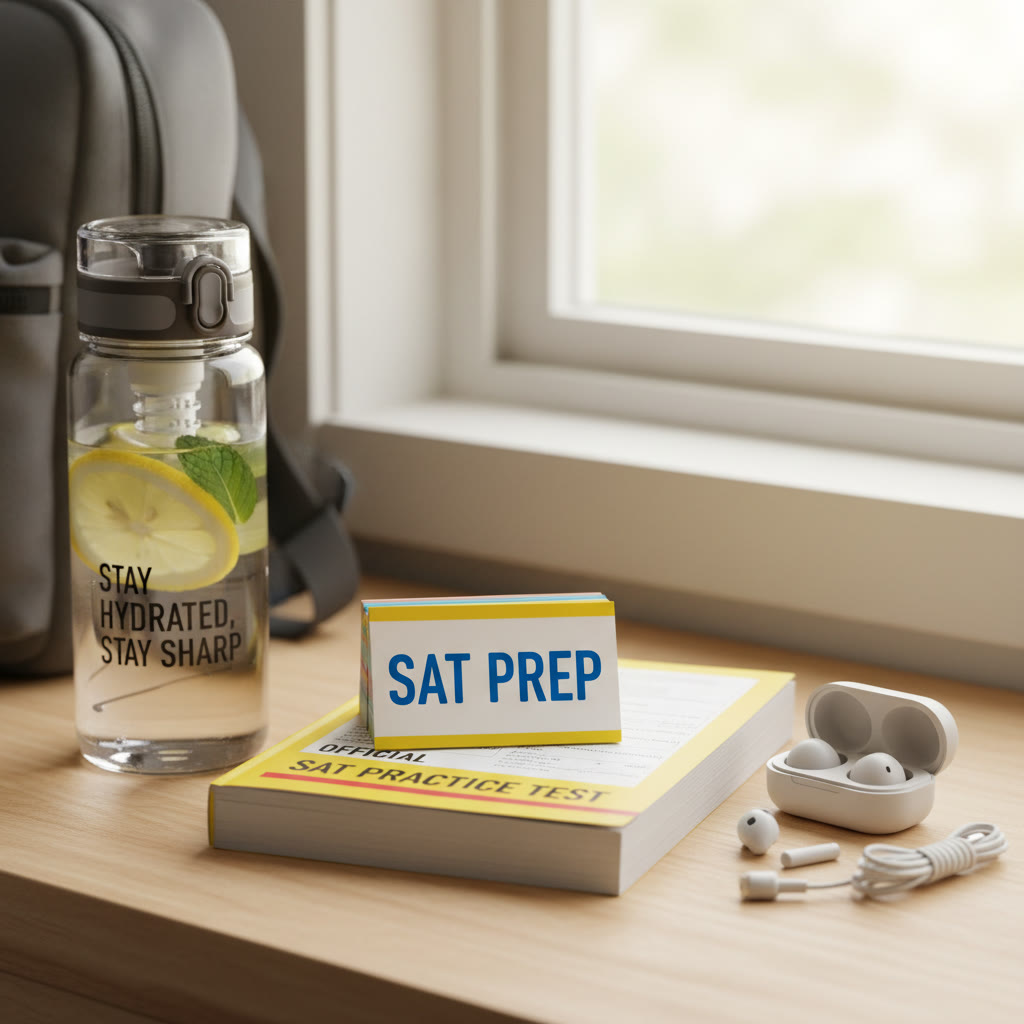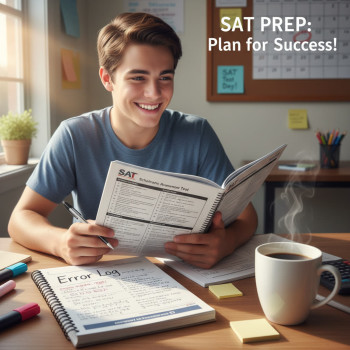Introduction: Why family functions feel like study kryptonite
You’ve spent weeks building a careful SAT plan: practice tests on Saturdays, targeted grammar drills midweek, vocabulary flashcards at night. Then your aunt announces a weekend family reunion, or your parents insist you attend a multi-day wedding. Suddenly your schedule looks like a house of cards, and you feel guilty either way—about missing time with family or about losing study momentum.
That tension is real, and it’s normal. Family events are social fuel: they recharge relationships, relieve stress, and shape who we are. But SAT preparation is also important, and the good news is that the two don’t have to be at war. With realistic planning, clear communication, and a few creative study techniques, you can honor both.
Start with mindset: permission, priorities, and flexibility
First, give yourself permission to enjoy family time. Holding a rigid gate around your schedule makes everything harder. Remember: quality studying beats quantity when you’re distracted and exhausted.
Three mindset shifts help:
- Prioritize practice, not perfection. Maintain momentum by doing high-impact, short sessions instead of insisting on long blocks of uninterrupted time.
- Plan for the event, not against it. Anticipate interruptions so you can fit in effective micro-study sessions.
- Practice flexible discipline. Be disciplined about your goals but flexible about the when and how.
Communicate clearly—without guilt
Short scripts that work
It’s easier to say you need time to study when you have a simple script. Here are a few you can use depending on the situation:
- To parents: “I really want to be here today. I also have a timed practice test tomorrow—can we find two hours tonight where I can focus and then join the dinner afterward?”
- To aunts/uncles: “I’m working toward a big test. I’ll hang out during the main events and step out for a focused study hour in between.”
- To close family: “If I do a short practice set now, I’ll be more present later—win-win.”
Most family members respond well to short, calm explanations. Give them the benefit of the doubt and assert your needs respectfully.
Create a compact, portable SAT plan for events
When you know a function is coming, design a condensed plan that fits pockets of time. Think of this as your event-specific blueprint:
- Identify your 1–2 highest-impact goals for the event period (e.g., one math topic to master, one reading passage practice).
- Choose micro-tasks that map to those goals (20–30 minute practice sets, 10-minute flashcard reviews).
- Schedule them around fixed event times—arrive early, study during travel, or use the lull after lunch.
Example: A wedding weekend plan
Imagine a Saturday wedding with family brunch at 10 a.m., ceremony at 1 p.m., and reception in the evening.
| Time | Activity | Purpose |
|---|---|---|
| 7:30–8:30 a.m. | Practice test section (math) | High-focus practice when you’re fresh |
| 9:00–9:15 a.m. | Review 10 flashcards | Quick memory reinforcement |
| 10:00–12:30 p.m. | Family brunch / socialize | Recharge and enjoy |
| 12:30–12:50 p.m. | Two short reading passages | Maintain test rhythm |
| 1:00–6:00 p.m. | Ceremony & reception (limited study) | Presence + rest |
| 6:30–7:00 p.m. | Score and review practice section | Immediate feedback to lock learning |
This table shows how to tuck study windows into natural breaks. Even modest progress keeps your brain moving forward without taking away from the event.
Micro-study tactics that actually stick
When your study time is limited, choose activities that provide maximal return on minimal time.
- Active recall: Use flashcards or a quick problem set. Active retrieval beats passive review.
- Timed mini-sections: Do one 20–30 minute SAT section under test-like timing to preserve rhythm.
- Focused review: Don’t just re-scan answers—write down mistakes and one action step to fix them.
- Mix it up: Alternate between math and evidence-based reading so you don’t burnout on one type of thinking.
Practical micro-study kit
Pack a small kit for events: a notebook, a pencil, a pocket-size timer (or your phone on Do Not Disturb), and a list of two specific goals. This keeps you intentional and prevents laziness.
Use social moments as study moments
Family events often include predictable lulls—the drive, waiting for food, or transit between venues. These can become study goldmines.
- Flashcard sprints in the car (auditory review if a driver is present).
- Discuss a logic-based puzzle with a cousin—teaching something out loud solidifies it.
- Turn vocal pauses into memory checks—recall a formula or grammar rule before dinner conversation resumes.
Be mindful of social cues—don’t withdraw entirely—but a brief, polite note like “I’ll step away for 20 minutes” is usually accepted.
Staying energized: sleep, snacks, and breaks
There’s a temptation to skimp on sleep to study more during a family event. That’s a trap. Cognitive performance hinges on rest and nutrition.
- Choose one consistent sleep goal (e.g., 7–8 hours). Keep it sacred.
- Pack brain-food snacks: nuts, fruit, yogurt—avoid heavy, greasy meals that lead to sleepiness.
- Use active breaks: short walks or a quick set of stretches can reset focus better than scrolling your phone.
If you’re traveling for an event, schedule your practice around peak alertness times rather than cram at night.
Real-world example: balancing prom weekend with SAT prep
Case study: Mia is a junior scheduled for the SAT in two months. Prom weekend includes a Saturday rehearsal dinner and Sunday afterparty. Instead of trying to study for hours, Mia and her Sparkl tutor created a small plan: one timed reading section Friday night, two 25-minute math drills Saturday morning, and a reflection review Sunday afternoon. She used flashcards in the car and a 15-minute walk to mentally reset before the test on Monday. She reported feeling present at prom and confident in her preparation.
What worked for Mia:
- She set realistic goals.
- She used micro-sessions aligned to her most fatigued times.
- She leaned on a tutor for accountability and targeted practice when she had a short study window.
How to respond when plans change
Family functions are famously unpredictable. Someone cancels, traffic sets you back, or a conversation runs long. The key is a simple recovery plan:
- Have a 30-minute emergency session ready: one passage + a quick review or a short problem set.
- Extend study into the next calm day, not the next frantic hour. Trying to ‘catch up’ during another busy moment usually fails.
- Log what you missed and reduce low-value activities elsewhere (e.g., skip a passive review session in favor of a focused drill).
Make the environment work for you
Events can be noisy and chaotic. A few practical environment hacks help you keep quality practice:
- Noise-cancelling or earplugs for focused sessions in noisy spaces.
- A small, quiet corner—often a parked car or an empty room—for a 25-minute timed practice.
- Use offline materials (paper practice sections) if Wi-Fi is unreliable at the venue.
Accountability without guilt
Accountability helps, but it shouldn’t add pressure. Communicate boundaries with family and enlist a study partner or a tutor for gentle check-ins. If you’re using a service like Sparkl’s personalized tutoring, let your tutor know about upcoming events; they can tailor short, high-impact sessions or provide AI-driven insights to maximize small practice windows.
How to choose what to study when time is limited
When every minute counts, prioritize activities that drive score improvements quickly.
- Weakest-topic focus: If you consistently miss a question type (e.g., geometry), a targeted short session will often produce more gain than general practice.
- Technique rehearsal: Practice pacing and test-taking strategies in a single short section.
- Error patterns: Spend 15 minutes reviewing mistakes from the last practice test and write one action item for each error type.
Think of your study window as a surgical strike: precise, short, and intentional.
Comparison: Long study blocks vs. micro-sessions
Long study blocks are great for deep learning when uninterrupted time is available. Micro-sessions are better during family events. Use long blocks for learning new concepts; use short sessions for retention and maintenance. Both have a role, and switching between them is a skill worth practicing.
Turn social support into a study advantage
Family members can be allies. A cousin studying the same subject becomes an impromptu study buddy. Older relatives often enjoy seeing progress—share a small, proud win like a new topic you’ve mastered; it invites encouragement without turning the event into a classroom.
If you have younger siblings, teaching them a grammar rule or math trick can strengthen your own understanding and help them at the same time.
Practical templates: three event-ready SAT plans
Use these templates to match your situation. Customize the exact content to your target weaknesses.
| Event Type | Duration | Study Template |
|---|---|---|
| Short evening gathering | 2–3 hours | 20–30 min focused practice before arrival, flashcards during transit, 15-min review after event |
| All-day family reunion | 6–10 hours | 1-hour focused work in morning, two 20-min micro-sessions between meals, 30-min review in evening |
| Multi-day wedding or trip | 2+ days | One long practice on day one, daily 25-min targeted sessions, integrate active recall during downtime |
When to pause studying completely
Sometimes the best choice is to step away. If you’re sleep-deprived, emotionally overwhelmed, or if the event represents an important family milestone, pausing can preserve long-term performance. Studies and tutoring experience show that occasional full breaks reduce burnout and improve retention. The crucial step is to plan the pause and resume with a clear, short plan so the pause doesn’t turn into a lengthy derailment.
Using tech wisely
Phones and apps can help or hurt. Avoid doomscrolling. Instead:
- Use a focused study app or set your phone to Do Not Disturb during timed practice.
- Save one set of digital flashcards offline for travel.
- Record a 5–10 minute audio summary of a concept and listen during transit or while doing mindless chores at the event.
Sparkl’s AI-driven insights can help you prioritize content for short study windows by analyzing practice-test errors and suggesting the highest-leverage activities—handy when you’re working with limited time.
Wrap-up: make the SAT plan part of your life, not your life
Balancing SAT prep with family functions is more art than science, but the rules are simple: be kind to yourself, plan realistically, and practice intentionally. Small, consistent actions beat last-minute marathons. Use micro-sessions, communicate your needs, and let family moments recharge you instead of stressing you out.
If you need help building event-ready study plans, consider one-on-one guidance. Sparkl’s personalized tutoring offers tailored study plans, expert tutors, and AI-driven insights that make those short study blocks count. A few sessions can help you design a portable plan that fits family life—so you can enjoy the moments that matter and still show up ready on test day.
Final checklist before the next family event
- Identify one or two high-impact goals for the event window.
- Pack a micro-study kit: paper, pencil, timer, flashcards, snacks.
- Set clear, calm expectations with family.
- Reserve one consistent sleep block.
- Plan one recovery session after the event.


Parting thought
Your SAT journey is a season, not a sentence. Family gatherings are part of what fuels you as a person. With thoughtful planning and a little creativity, you can keep your study momentum and show up for both the test and the people who matter. That balance is a skill that will help you long after the SAT is behind you.














No Comments
Leave a comment Cancel